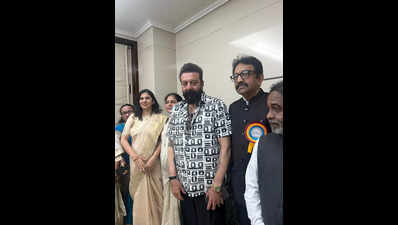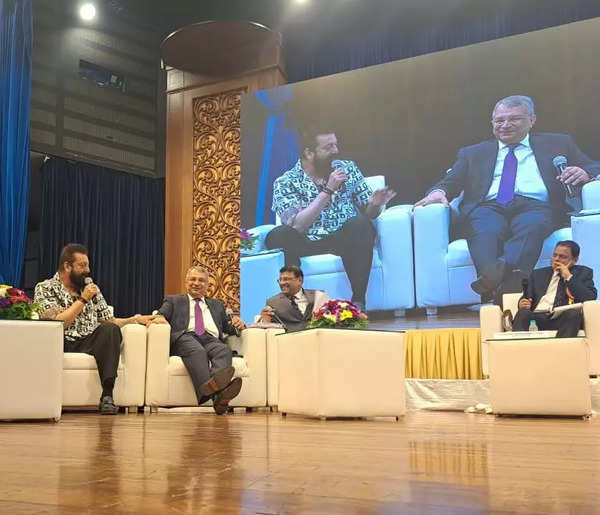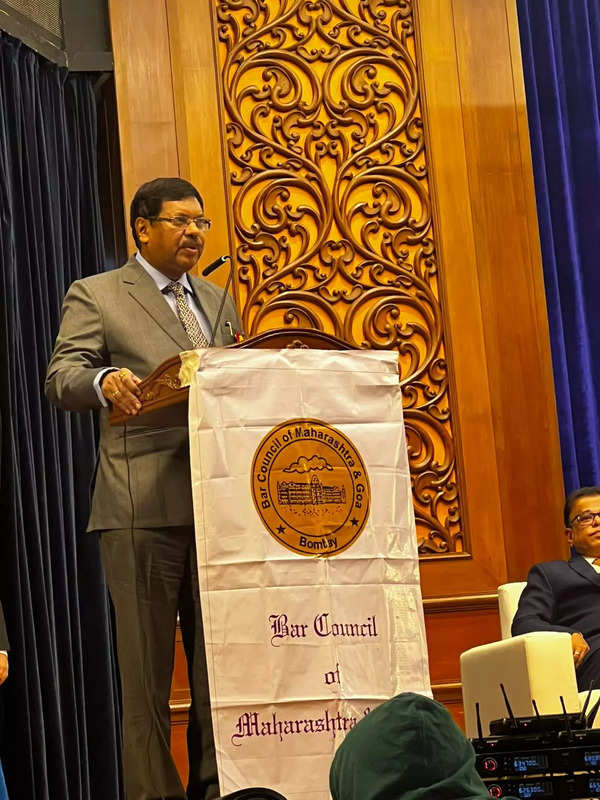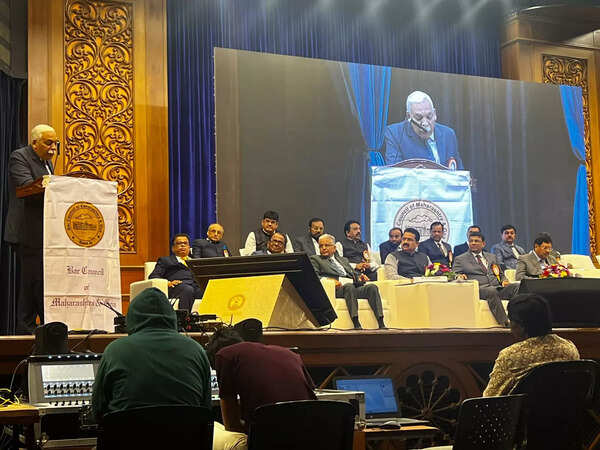
MUMBAI: “Everyone should be a law-abiding citizen and everyone should know the laws,” said Sanjay Dutt on Sunday. The actor, now in his 60s, made a cameo appearance at the ‘continuous education’ programme of the Bar Council of Maharashtra and Goa, where Justice Bhushan Gavai of the Supreme Court inaugurated TASKS—Trial Analysis Study and Knowledge Seminars.

The discussion focused on Dutt’s case, where he was convicted and sentenced to five years under the Arms Act.
“Don’t break the law and make no mistakes. Legal knowledge should be something not just law students but even the common man should imbibe,” Dutt earnestly expressed in his baritone voice when Advocate Sangram Desai, chief of the Bar Council of Maharashtra and Goa, asked him during a panel discussion what his takeaway was from his stint in prison.
Regarding reforms, Dutt suggested that “convicts be allowed a chance to have a meal with family” to not feel completely cut off and spoke of the need to not categorise all as the same and to display some consideration for convicts.

He mentioned he was the director of a play-theatre group of 50—mostly murder lifers—who had tears in their eyes when the play got cancelled after rigorous practice for 45 days. Sporting a beard for a movie shoot, which he took a break from to attend the Bar Council event, he also mentioned that when arrested, he had no clue what TADA (Terrorist and Disruptive Activities (Prevention) Act) was and said he went “baap re” when he learned what it was. There was a ripple of laughter in a packed auditorium at the Swami Narayan temple hall in Dadar. Dutt was acquitted under the draconian Act by the Special TADA Judge P D Kode in 2006 after being tried in the 1993 BBC case, but he served five years for briefly having and destroying an AK-56 rifle.
He said Special Public Prosecutor Ujjwal Nikam and retired ACP Suresh Walishetty were both among “the greatest” at their jobs, as was his lawyer Satish Maneshinde, when Desai asked what he thought of them now, 18 years post-verdict.
As ever, he was a crowd-puller on Sunday too. The event, aimed at equipping and empowering young lawyers with skills in arguing, preparing, and handling criminal trials, was conducted under the fair watchful gaze of retired HC Justice S K Shinde.
Special PP in the 1993 Bombay Bomb blasts case, Ujjwal Nikam, said the case was based on circumstantial evidence, not direct, and the circle of evidence was proven with confessions and recoveries. Meanwhile, Dutt’s counsel, Satish Maneshinde, said if the trial were held in today’s times with digital evidence of CCTV footage, the outcome could well have been different, with no sentence for the actor.
A trial is the foundation of any judicial system and underscores the importance of rule of law and the administration of justice said Justice Gavai who is due to be the next CJI. Both, he and Bombay high court Chief Justice Devendra Kumar Upadhyaya highlighted the importance of the two essential legal principles that ensure citizens’ rights are not thwarted. Justice Gavai said the legal profession is one where learning is “eternal’’ and the day someone says he knows everything, could be his last day in the profession.

He applauded the Bar Council’s initiative. He added “Lawyers must be honest and ethical in presenting their case. Unfortunately some lawyers give false hopes to their clients, a practice that the legal system deprecates.’’
Justice Gavai emphasized that studying the trial processes is indispensable for the growth of legal practitioners. It helps all the individuals in the field of law, to understand the precedents, interpret the statutes, and note the nuances of the procedure. Each trial contributes to the evolving fabric of Indian jurisprudence. Gavai highlighted how knowledge of the law, is essential for both, law navigators and justice seekers.
The knowledge of both, substantive and procedural law, acts as the backbone of effective trial practice. They range from understanding the core legal principles and rights enshrined under the Constitution, statutes and judicial precedents to the rules that govern the unfolding of a trial, right from filing of a plaint to the judgement delivered.
In the existence of the hierarchy of the courts, from district courts to the Supreme Court of India, knowledge equips practitioners to navigate the legal system effectively. Gavai said, “Lastly, the most important aspect of any trial is to acquit the innocent and convict the guilty.
As it is said, “It is better to let 10 guilty escape than let a single innocent suffer,” and added, “We must ensure that no innocent person is punished.” CJ Upadhyaya underscoring the importance of ‘rule of law’ –as opposed to rule of will or whims, he said, must be protected and defended with zeal by lawyers and a parting shot for young lawyers, he said, is to oodles of patience, a good mentor, and enrich their knowledge, to shine later.



